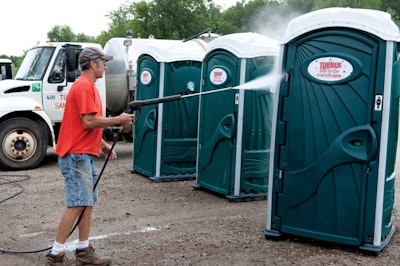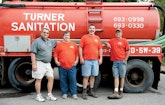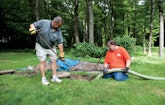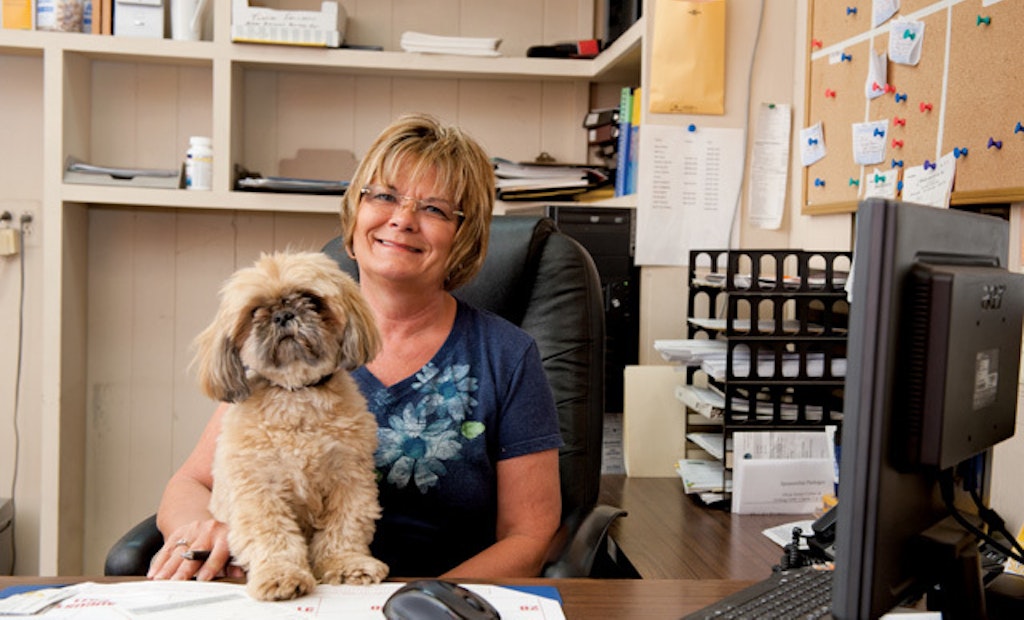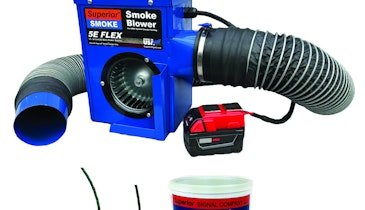Interested in Portable Sanitation?
Get Portable Sanitation articles, news and videos right in your inbox! Sign up now.
Portable Sanitation + Get AlertsDetective skills are often as important as pumping experience for employees at Turner Sanitation in Lake Orion, Mich.
Too many new homeowners don’t realize their property isn’t tied to city sewer, and that they are responsible for their own septic systems, says Steve Yerkes, who owns the Detroit-area septic service and portable sanitation business with his wife, Janet. Then, when something goes wrong – often in the middle of winter – homeowners call for help and have no idea where the septic tank is located.
Thankfully, workers at Turner Sanitation are good at solving mysteries because of the lessons learned from the company’s experienced, common sense founder as well as a Prototek locator.
Sadly, the Yerkes lost the founder, Janet’s father, Bob Turner, 82, to cancer in 2010. But after spending time with him soaking up knowledge about the wastewater industry, the couple intends to carry on Turner’s values, adding their own skills and tapping new ways to promote their services.
STARTED EXCAVATING
Turner worked in heavy machinery repairs and construction for the U.S. Army in Korea. When he came home, he used those skills to start his Detroit-area excavating business. With demand for septic systems, he became a master plumber and grew adept at reading the land. He had a good record of accurately predicting whether soil would perk for a simple gravity system or if an engineered system would be needed.
By 1987, he officially established Turner Sanitation with the purchase of a 1,000-gallon waste/500-gallon freshwater vacuum truck and a couple dozen portable restrooms. He continued his excavating and plumbing business as well.
“He was excavating and installing systems and had calls to pump them,” Janet recalls. “Though it wasn’t as popular then, he saw the need for portable units for weekend parties.”
Turner’s good reputation with builders jump-started his new venture as he focused on Oakland County and parts of Macomb and Lapeer counties, with a dense population of rural residents just outside the metro area.
“He went over the top with service,” Steve adds. “He wanted it all done yesterday. The (technicians) didn’t come home until they finished the job. Customers got what he promised on a handshake.”
Turner’s Army training helped keep costs down. He and a mechanic took care of equipment maintenance.
“We’ve probably got five or six trailers of plumbing parts and pumps,” Steve says, noting that municipal and township maintenance people often called Turner for advice and for parts.
Instead of buying all new vacuum trucks, Turner purchased a chassis, tank and equipment and worked with his crew to build the company’s trucks, including a current portable sanitation truck built on a 1999 Freightliner chassis.
JOINING FORCES
Janet and Steve lived in Kentucky and managed three pizza restaurants in partnership with Turner. He visited and kept them apprised of his Michigan business – often as part of his annual trip to the Pumper & Cleaner Environmental Expo International. Steve and Janet eventually moved back to Michigan to be closer to family and help with the business.
Steve admits he had a lot to learn about the wastewater industry, but he built good working relationships with vendors at the Pumper & Cleaner Expos, and he had entrepreneurial skills.
“One thing that hasn’t changed is good customer service. That’s what my forte is,” Steve says. “I transfer the phones from the office to my cell after hours to receive all calls. That was Mr. Turner’s rule: Never miss a call. If you don’t answer the phone, you don’t get the business.”
Working with Turner, he learned new lessons every day. One of his first lessons was the importance of educating customers. “I found out most people who move from the city to the country don’t know anything about septic systems,” Steve says. “It’s something they should know about when they buy the house.”
He spends time explaining how systems work, and he emphasizes the importance of not flushing certain items down the toilet – such as baby wipes and feminine hygiene products.
Janet joined the business in 2004 to take care of the office and accounting – work she was familiar with from her restaurant experience.
“I had been around it all my life, with conversations about the business, and I had worked before with him, so it wasn’t hard to fit back in,” she says. Janet also took care of ordering advertising that the three of them decided on together.
WORK & EQUIPMENT
Residential septic systems make up 80-85 percent of the base for the pumping side of Turner Sanitation. “Unfortunately, with the economy, (homeowners) aren’t pumping as often as they should be. We send them reminders about pumping every three years or as often as they request it,” Steve notes. “Some aren’t doing it at all, and they call us when they are having a problem.”
Other clients are factories, group homes, and park and RV pump stations that require monthly or biannual pumping.
Turner Sanitation has three trucks: a 2001 Sterling from Vacutrux Limited with a 3,500-gallon steel tank and Wallenstein (Elmira Machine Industries Inc.) pump; a 1989 Ford L9000 with a 3,500-gallon steel tank, and a 2005 International 4300 with a 1,500-gallon waste/500-gallon freshwater aluminum tank and Masport Inc. pump from Tri-State Tank. The 1999 Freightliner Turner built pulls two Explorer Trailers (McKee Technologies) and a Turner-assembled trailer that haul, 6, 10 and 14 units. The truck carries a 500-gallon waste/300 gallon freshwater steel tank and Masport pump.
“Plus we have a stake truck, and we plan to put a slide-in unit on a pickup for portable units for places we can’t go with bigger trucks – such as golf courses,” Steve says. “We do a lot of Little Leagues, park and rec departments and golf courses.” He is researching smaller vac systems with 300-gallon waste/150-gallon freshwater tanks.
Portable restroom rentals bring in about 30 percent of Turner Sanitation’s income. Workers are especially busy in June setting up units for weddings and graduations. The Yerkes continually bid for new events, and their units are frequently placed at farmers markets, community festivals, an apple and arts festival, Fourth of July event and car shows.
Since the construction end of portable rentals is down because of Michigan’s sluggish building market, growing the event side is important, Steve says. To that end, he has made some strategic changes in restroom inventory to suit the needs of different customers.
When Steve joined the company, its inventory included restrooms from five different manufacturers. He started buying predominantly Five Peaks Technology units, partly because he wanted to support a company based in his home state, and partly because he likes their look. Most are forest green to blend in – especially at golf courses and parks. He also has orange units for construction sites and red, white and blue units for military venues. All units have hand sanitizers.
The Yerkes also have portable handicapped units made by PolyPortables Inc., and flush units made by PolyJohn Enterprises. The Yerkes’ maintain about 300 units – half earmarked for construction, half for events.
FINDING NEW WAYS
Cutbacks in the automotive industry and Michigan’s high unemployment rate have created business challenges. For example, Turner Sanitation once had a few portable units at a General Motors plant, which closed. It is scheduled to reopen, and the Yerkes hope to place units there again.
“The economy has affected us quite a bit as well as increases in dumping fees and fuel. We raised prices in the last two years, and that’s hard to explain to customers,” Janet says.
With people seeking bargains on foreclosed homes, the company has seen some increased business doing septic inspections. Steve has mixed feelings about the work. People want to know the condition of the septic system before they buy, but he discourages them if the system hasn’t been used for a few months.
“I tell them it’s not worth it to spend the money until they’ve lived there awhile,” Steve says, since pre-sale inspections don’t reveal some problems. With properties selling cheaply, most buyers are willing to take a chance and pay for septic repairs if a problem emerges after the system is being used regularly again.
The business climate is far different from when Turner began. There are many more regulations, and written contracts have replaced handshake deals. Landing special events contracts has become even more important. The Yerkes scour festival lists and church and town events and send out mailings during the winter months.
They look for ways to streamline and modernize the business. The company now uses TAC 2010 from Clear Computing Inc., for instance, for billing and mailing cards to tracking routes and restrooms. Also, the Yerkes are upgrading their website and increasing their online presence, as well as continuing exposure in traditional places such as the Yellow Pages.
“People Google more than they pick up a phone book,” Steve says. At a continuing education class, he met a young pumper who said he only uses a Blackberry. It provides him with everything he needs – wherever he is.
KEEPING A WORK ETHIC ALIVE
The Yerkes know that it takes more than just technology to create a successful business. Turner’s discipline and rules are still part of the business. So is the legacy of the good name he left them.
“We don’t plan on changing the name because it’s a well-known name in the area. We are trying to keep my dad’s work ethic of taking care of customers and that our word is good,” Janet says.
“He left us a very good, solid business, and our goal is to maintain it and make a living off it,” Steve adds.
